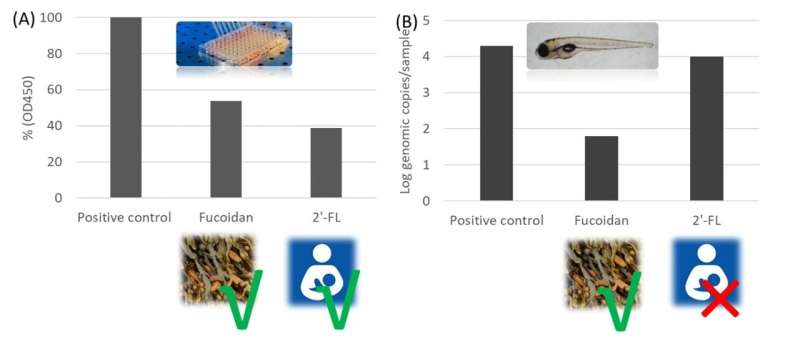
National University of Singapore food virologists have found that fucoidan, a naturally occurring carbohydrate could be a potential anti-viral candidate for the human norovirus.
Human noroviruses (hNoVs) are increasingly being identified as an important cause of acute gastroenteritis outbreaks associated with significant disease burden worldwide. These viruses are very contagious and can cause symptoms such as vomiting and diarrhea. As it is difficult to cultivate hNoVs using routine cell cultures in the laboratory, this has hindered the research progress on them. Recently, it has been reported that zebrafish larvae can be used as a reliable model to study hNoVs for the development of antiviral strategies.
A research team led by Prof Li Dan, Department of Food Science and Technology together with Prof Gong Zhiyuan, Department of Biological Sciences, found that fucoidan, a natural compound found in many species of brown seaweed is able to inhibit nNoVs replication in the zebrafish larvae model. The researchers tested two types of carbohydrate with potential anti-hNoVs effects. One of the carbohydrate is fucoidan, extracted from the brown algae Fucus vesiculosus. The other is 2′-Fucosyllactose, an important oligosaccharide found in human breast milk. The researchers found that although both carbohydrates are able to block the binding of the hNoV to the human histo-blood group antigens (HBGAs, putative receptors of hNoV infection) under in vitro conditions, only fucoidan but not 2′-Fucosyllactose inhibits the hNoV replication in the zebrafish larvae (see Figure).
This result is of great interest as this is the first report showing that the blocking of HBGA binding sites under in vitro conditions may not necessarily prevent hNoV replication in a living organism. Previously, the in vitro HBGA-binding block assay has been used in many research studies to screen anti-hNoV candidates. Human breast milk oligosaccharides such as 2′-Fucosyllactose were believed to be able to prevent hNoV infection based on the same principle.
Source: Read Full Article